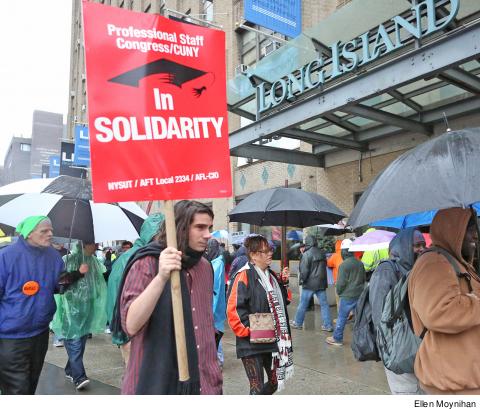 |
When the Long Island University (LIU) administration locked out faculty on its Brooklyn campus last September in the midst of contract negotiations, the LIU Faculty Federation gained the national spotlight as the poster child for the corporatization of the university. Colleagues across the country watched closely to see what would happen, fearful that the LIU lockout – a precedent-setting labor action in higher education – could pave the way for other university presidents and boards of trustees to do the same.
When the lockout ended, we called it a victory – management was bruised by bad press and faculty emerged as heroes of the growing academic precariat. But even then we knew we’d only won a battle; the war would rage on.
Not surprisingly, morale plummeted as nonbinding mediation failed and bargaining proceeded as a one-way conversation: The union spoke and management took orders from LIU President Kimberly Cline. Her power over negotiations and the rumor that she’d reviewed promotion and tenure files with an attorney were deeply troubling.
FACULTY INTIMIDATION
Already afraid of losing their jobs, faculty understandably felt vulnerable as management sought to intimidate and bully us into submission while keeping up a rhetorical pretense of supporting “academic excellence” and shared governance.
The situation only got worse. In early 2017, the Board of Trustees issued two unilateral mandates – one to close academic programs, despite a review process that is supposedly part of the strategic plan, the other to reduce the core curriculum from over 50 to 30-33 credits. Between LIU’s two campuses (Brooklyn and C.W. Post on Long Island), close to 50 programs, mostly in the liberal arts and sciences, have been “stayed,” consolidated or “sunsetted.” Pressed for clarification of the timeline, administrators told us to trust them: “Reason would prevail,” they said. Really?
Meanwhile, our extended contract expires May 31. We face the possibility of another lockout. We may have to work without a contract and continue to negotiate. Our experience with bargaining and mediation has been dismal, but it must change. And that is why we rallied April 6: to tell administrators, enough; it is time to bargain in good faith.
UNIVERSITY, INC.
Here is my message to President Cline: I have been outspoken about my opposition to the corporatization of the university and the unjust treatment of campus workers as well as students. Together with many of my colleagues, I have stood up for what I believe to be right, for academic integrity and quality, for student rights, for shared governance, for access to education and for a democratic process in the workplace.
Give the LIU unions fair contracts and we will work to rebuild this cored-out university.
Deborah Mutnick is a professor of English at LIU and a member of the Executive Committee of the LIU Faculty Federation. A version of this article originally appeared on the American Federation of Teachers’ website.

